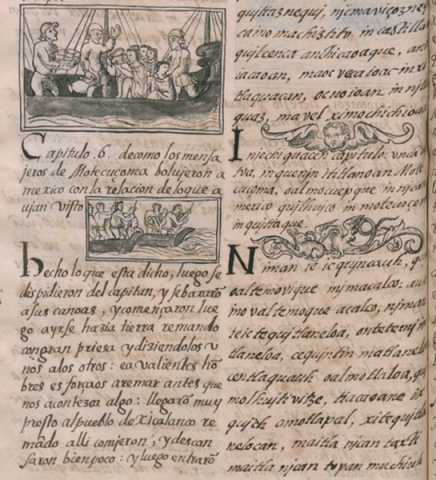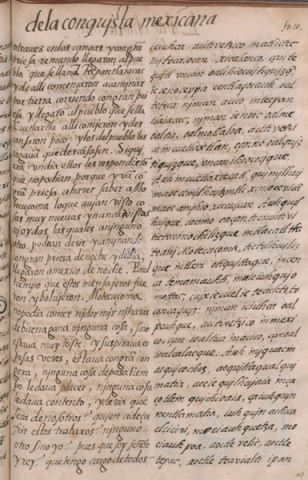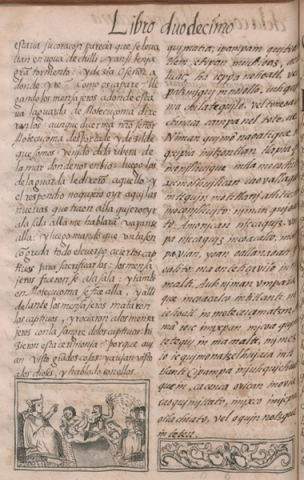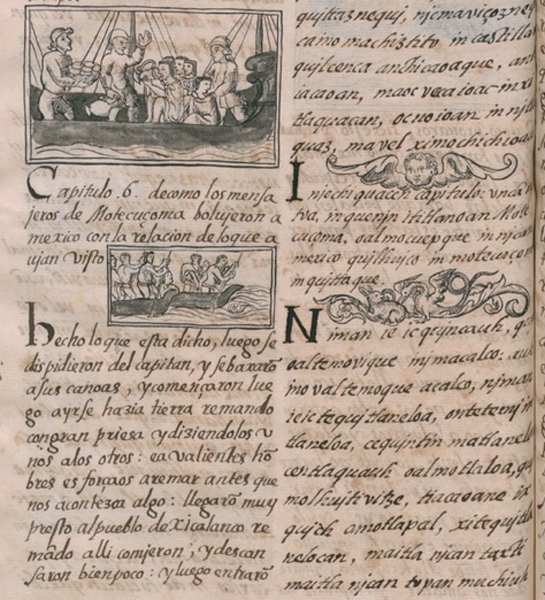 |
[Transcription of the Nahuatl (right-hand column) by James Lockhart:]
[f. 9v. cont.] Inic chiquacencapitulo: vncā mitoa, in quenin ititlanoan Motecuçoma, oalmocuepque in nican mexico quilhuicoin motecuçoma in quittaque.
Niman ie ic quincauh, quinoaltemovique in imacalco: auh in ovaltemoque acalco, niman ie ic tequitlaneloa, ontetemi in tlaneloa, cequintin matlaneloa. centlaquauh oalmotlaloa, quimolhuitivitze, tiacaoane ixquichamotlapal, xitequitlanelocan, ma itla nican taxti ma itlanican topan muchiuh:
|
[Translation of the Nahuatl (right-hand column) by James Lockhart:]
Sixth chapter, where it is said how Moteucçoma’s messengers came back here to Mexico to tell Moteucçoma what they had seen.
Then [Cortés] let them go. [The Spaniards] lowered them into their boat, and when they had descended into the boat, they paddled hard; each one paddled as hard as he could, and some used their hands to paddle. They fled with all possible speed, saying to each other as they came, “Oh warriors, exert all your strength, paddle hard! Let’s not do something [wrong] here, lest something happen to us!”
[Translation of the Spanish (left-hand column) by James Lockhart:]
Chapter Six, of how Moteucçoma's messengers returned to Mexico with an account of what they had seen.
When the above-said had been done, they took leave of the captain, descended into their canoes, and immediately began to go paddling landward with great haste, telling one another, "Up and at it, brave men, paddle hard, before something happens to us!"
Paddling along, they very quickly reached the settlement of Xicalanco; there they ate and rested a very short while. Then they reembarked
|
[Translation of the Nahuatl into Spanish by Fr. Bernardino de Sahagún; transcription of the Spanish (left-hand column) by James Lockhart:]
[f. 9v. cont.] Capitulo .6. de como los mensajeros de Motecuçoma boluieron a mexico con la relacion de lo que auian visto.
Hecho lo que esta dicho, luego se despidieron del capitan, y se baxarō a sus canoas, y començaron luego a yrse hazia tierra remando con gran priesa y diziendo los vnos a los otros: ea valientes hōbres esforçaos a remar antes que nos acontezca algo:
llegarō muy presto al pueblo de Xicalanco remādo alli comieron, y descansaron bien poco: y luego entrarō
|
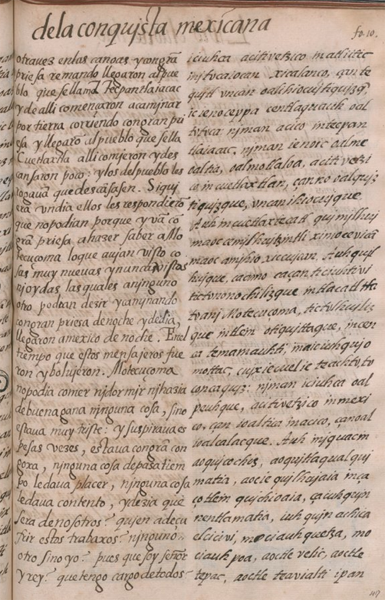 |
[Transcription of the Nahuatl (right-hand column) by James Lockhart:]
[f. 10r.] iciuhca acitivetzico in atl iitic in itocaiocanxicalanco, çan tequitl vncan oalihiocuitiquizq̄, ic ie no ceppa centlaquauh oaltotoca: niman acico in tecpantlaiacac, niman ie no ic oalmeoaltia, oalmotlaloa, acitivetzico in cuetlaxtlan, çanno oalquiztiquizque, vncan ihiocuique.
Auh in cuetlaxtecatl quimilhui ma oc cemilhuitzintli ximocevicā ma oc amihio xiccuican.
Auh quilhuique, ca amo ca çan ticiuhtivi tictono-nochilizque in tlacatl tlatoani Motecuçoma, tictolhuilizque in tlein otiquittaque, in cenca temamauhti, in aiciuhqui omottac, cuix ie cuel ie teachto, toconcaquiz:
niman iciuhca oalpeuhque, activetzico in mexico, çan ioaltica in acico, çan oalioalcalacque.
Auh in iquac in aoquicochiz, aoquitlaqual quimatia,aoc ie quilhuiaia in çaço tlein quichioaia, ça iuhquin nentlamatia, iuhquin achica elcicivi, mociauhquetza, mociauhpoa, aoctle velic, aoctle tepac, aoctle teavialti ipan
|
[Translation of the Nahuatl (right-hand column) by James Lockhart:]
By water they quickly reached the place called Xicalanco, where they did nothing but catch their breath, then again came running along as fast as possible. Then they reached Tecpantlayacac, where upon they again left and came fleeing. They quickly got to Cuetlaxtlan, where they caught their breath and also quickly came away.
And the <ruler or steward> of Cuetlaxtlan said to them, “First take your rest for a day or so, until you recover your strength.”
But they said to him, “No, rather we are going hurrying to talk to the lord ruler Moteucçoma, to tell him what we saw, these very terrifying things the like of which have never been seen. Perhaps you are the very first to hear them.”
Then they quickly got on their way and soon reached Mexico. It was night when they got there; they came in by night.
During this time Moteucçoma neither slept nor touched food. Whatever he did, he was abstracted; it seemed as though he was ill at ease, frequently sighing. He tired and felt weak. He no longer found anything tasteful, enjoyable, or amusing.
[Translation of the Spanish (left-hand column) by James Lockhart:]
in the canoes, and paddling with great haste reached the settlement called Tecpantlayacac. From there they commenced to travel by land, running with great haste. Reaching a settlement called Cuetlaxtlan, they ate there and rested little.
The people of the settlement asked them to rest even for a day.
But they answered them that they could not because they were going with great haste to inform Moteucçoma what they had seen, very new things never seen or heard, which they could tell to no one else.
Traveling with great haste night and day, they reached Mexico at night.
In the time while these messengers went and returned, Moteucçoma was unable to eat or sleep or take joy in anything he did, but was very melancholy, sighing frequently; he suffered great anxiety, and no pastime gave him pleasure, nothing made him happy.
He said, "What is to come of us? Who is to suffer these travails? None other than I, for I am lord and king who is in charge of everyone!"
|
[Translation of the Nahuatl into Spanish by Fr. Bernardino de Sahagún; transcription of the Spanish (left-hand column) by James Lockhart:]
[f. 10r.] otra uez en las canoas y con grā priesa remando llegaron al pueblo que se llama Tecpantlaiacac y de alli començaron a caminar por tierra corriendo con gran priesa y llegarō al pueblo que se lla* Cuetlaxtla alli comieron y descansaron poco:
y los del pueblo les rogauā que descāsen. Siquiera vn dia
ellos les respondierō que no podian porque yvā cō grā priesa a hazer saber a Motecuçoma lo que auian visto cosas muy nueuas y nunca vistas ni oydas las quales a ninguno otro podian dezir
y caminando con gran priesa de noche y de dia, llegaron a mexico de noche.
En el tiempo que estos mensajeros fueron y boluieron. Motecuçoma no podia comer ni dormir ni hazia de buena gana ninguna cosa, sino estaua muy triste: y suspiraua espesas vezes, estaua con grā congoxa, ninguna cosa de pasatiempo le daua placer, ninguna cosa le daua contento,
y dezia que sera de nosotros? quien a de çufrir estos trabaxos? ninguno otro sino yo! pues que soy señor y rey! que tengo cargo de todos!
----------
*LLA. For "llama."
|
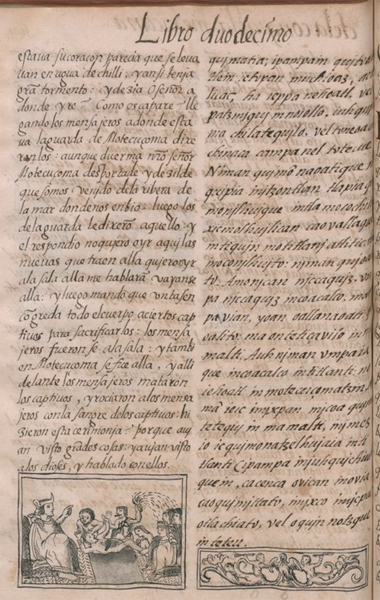 |
[Transcription of the Nahuatl (right-hand column) by James Lockhart:]
[f. 10v.] quimatia;
ipampa in quitoaia, tlein ie topan muchioaz, ac nelicac, ha ieppa nehoatl,* vel patzmiqui in noiollo, iuhquin ma chilatequilo, vel toneoa chichinaca campanel totecue.
Niman quimōnaoatique in quipia in itzontlan tlapiaquimonilhuique intla mocochitia xicmolhuilican ca o-vallaque in tiquinmotitlani atl itic.
Auh in oconilhuito: niman quioalito. Amo nican niccaquiz, vmpa niccaquiz in coacalco, ma vmpa vian, yoan oallanaoati: quioalito: ma ontetiçavilo in mamalti.
Auh niman vmpa iaque in coacalco in titlanti: no iehoatl in motecuçomatzin, nimā ie ic imixpan micoa quimeltetequi in mamalti, in imezio ic quimonatzelhuiaia in titlanti ipampa in iuh quichiuhque in, ca cenca ovican in ovia ca oquimittato, imixco imicpac otlachiato, vel oquinnotzque in teteu.
----------
*AC NEL ICAC, HA IEPPA NEHOATL. These two idioms are not well understood and seem not to be recorded anywhere else. I have built on the Spanish version, but the result is more than normally speculative.
|
[Translation of the Nahuatl (right-hand column) by James Lockhart:]
Therefore he said, “What is to come of us? Who in the world must endure it? Will it not be me [as ruler]? My heart is tormented, as though chile water were poured on it; it greatly burns and smarts. Where in the world [are we to turn], oh our lord?”
Then [the messengers] notified those who guarded [Moteucçoma], who kept watch at the head of his bed, saying to them, “Even if he is asleep, tell him, ‘Those whom you sent out on the sea have come back.’”
But when they went to tell him, he replied, “I will not hear it here. I will hear it at the Coacalco; let them go there.” And he gave orders, saying, “Let some captives be covered with chalk [for sacrifice].”
Then the messengers went to the Coacalco, and so did Moteucçoma. Thereupon the captives died in their presence; they cut open their chests and sprinkled their blood on the messengers. (The reasons they did it was that they had gone to very dangerous places and had seen, gazed on the countenances of, and spoken to the gods.)
[Translation of the Spanish (left-hand column) by James Lockhart:]
His heart seemed as though it had been washed in chile water, and so he was greatly tortured. He said, "O lord, where am I to go? How am I to escape?"
When the messengers got to where Moteucçoma's guards were, they told them, "Even though our lord Motecuçoma should be sleeping, wake him and tell him that we have come from the seashore where he sent us."
Then the guards told him, and he answered, "Here I don't want to hear the news they bring; I want to go to the hall; there they are to speak to me. Let them go there." Then he ordered that the whole bodies of certain captives be anointed with chalk for them to be sacrificed.
The messengers went to the hall, and Moteucçoma went too. There they killed the captives in the presence of the messengers and sprinkled the blood of the captives on them. They performed this ceremony because they had seen great things; they had seen the gods and talked with them.
|
[Translation of the Nahuatl into Spanish by Fr. Bernardino de Sahagún; transcription of the Spanish (left-hand column) by James Lockhart:]
[f. 10v.] estaua su coraçon parecia que se leuauan* en agua de chilli, y ansi tenia grā tormento: y dezia O señor a donde yre? Como escapare?
llegando los mensajeros a donde estaua la guarda de Motecuçoma dixeronlos: aunque duerma n̄r̄o señor Motecuçoma desportade** y dezilde que somos venido de la ribera de la mar donde nos enbio:
luego los de la guarda le dixerō aquello: y el respondio no quiero oyr aqui las nueuas que traen alla quiero yr a la sala alla me hablarā vayanse alla: y luego mando que vntasen cō greda todo el cuerpo a ciertos captiuos para sacrificarlos:
los mensajeros fueronse a la sala: y tambien Motecuçoma se fue alla, y alli delante los mensajeros mataron los captiuos, y rociaron a los mensajeros con la sangre de los captiuos: hizieron esta cerimonia?*** porque auian visto grādes cosas: y auian visto a los dioses, y hablado con ellos.
----------
*LEUAUAN. For "lauaua," though perhaps the writer intended the final n as a plural.
**DESPORTADE. For "despertalde."
***CERIMONIA. This word is more standardly written "ceremonia," but the form in the text is also seen in sixteenth-century Spanish writing.
|
